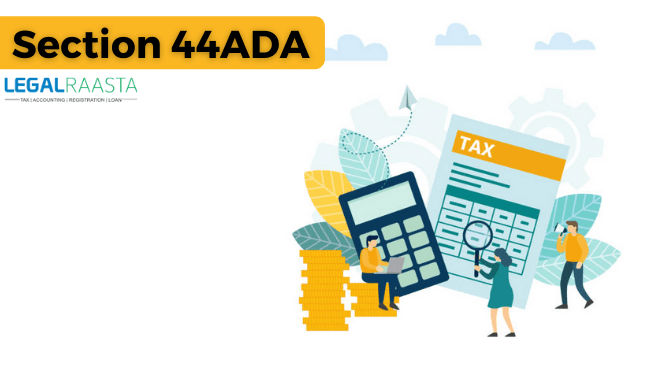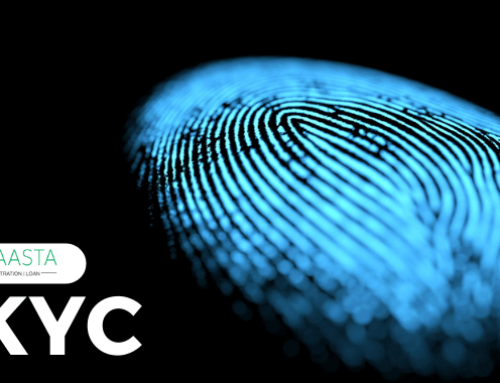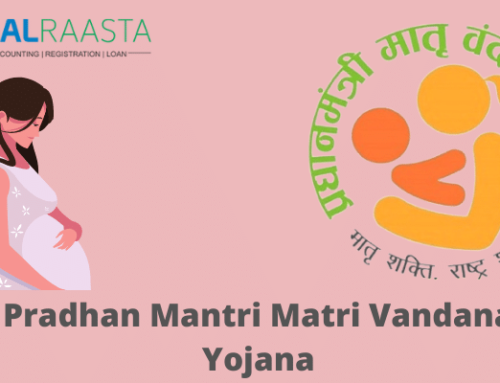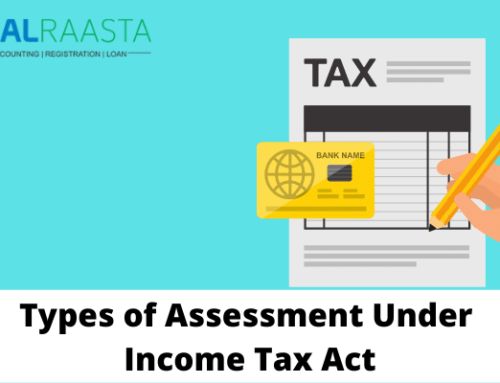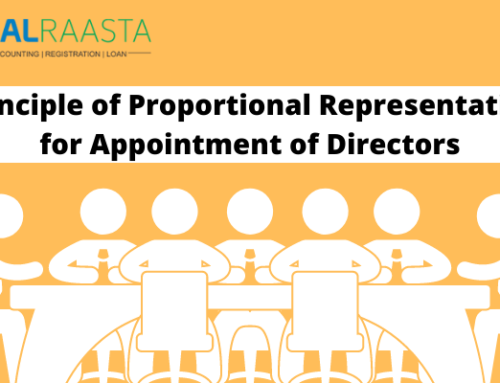India has a wide variety of businesses, and India’s economy is strong. India is the world’s fastest-growing major economy with its booming industries, including construction, automobile manufacturing, and mining production. India is also one of the largest importers and exporters in the world. With such a diverse range of businesses happening in India–and so many opportunities for success–it’s no wonder that there are some Indian professionals who have been successful enough to be considered “small” by Section 44ADA standards.
What is section 44ADA?
Contents
- What is section 44ADA?
- The most recent update
- Scope and Purpose of section 44ADA
- Assessees eligible for the Section 44ADA
- Who is Eligible for Section 44ADA?
- Eligible Professionals under Section 44ADA
- What is the presumptive income offered?
- What benefits will an assessee get by following Section 44ADA?
- When shall an assessee maintain books and get the accounts audited?
- When shall an assessee maintain books and get the accounts audited?
- Implications of choosing Section 44ADA
- Implications of choosing section 44ADA include:
- Final Words
Section 44ADA provides a simple method of taxation for small professionals under Section 44AA(1) of the Income Tax Act, 1961. The Act mentions professions like accountants, lawyers, architects, or engineers as examples where Section 44ADA can be applied. India’s Section 44ADA offers a scheme of presumptive taxation of profits and gains arising from professions mentioned under Section 44AA(1) of the Income Tax Act, 1961.
The idea behind India’s Section 44ADA is to avoid unnecessarily detailed scrutiny for taxpayers in certain income groups; when it comes to professionals like architects or accountants with gross receipts not exceeding Rs 150 lakhs (Rs 1.5 Million). India’s Section 44ADA provides taxpayers in this category an option to file their returns once in three years, which would help them save time and resources without compromising on compliance requirements.
According to India’s Act, such taxpayers can declare their income and pay taxes according to a prescribed profit ratio without having to provide any receipts or other documents. India’s Section 44ADA requires them to file their income tax returns online, like the rest of India’s taxpayers. Once they avail of this option, India’s Section 44ADA provides tax relief in terms of lower penalty for late filing and lower interest rates on non-payment of taxes. India has over 5 lakhs (500 thousand) registered taxpayers under India’s Section 44ADA scheme.
India’s Section 44ADA helps professionals with a small income to save time and work efficiently without compromising on compliance requirements. When it comes to choosing between India’s Section 44ADA and filing annual returns for every year, India’s Section 44ADA is beneficial because not only does it offer a way out of monthly filings but also because India’s Section 44ADA provides tax relief in terms of lower penalty for late filing and lower interest rates on non-payment of taxes. India’s Section 44ADA also helps India’s professionals to get refunds promptly, if any are due. India’s Section 44ADA is suitable for individuals who have opted under the presumptive taxation scheme. India’s Section 44ADA can be availed by income tax assessees without having to furnish proof of their expenses under India’s Section 44ADA.
Under India’s Section 44ADA, it isn’t necessary for taxpayers to maintain books of account or record their income in order to avail of this provision because India’s Section 44ADA uses a prescribed method to calculate taxable profits based on receipts that are received on a day-to-day basis. India’s Section 44ADA is an attractive option for small professionals who do not want to go through the hassle of maintaining books of account and documenting expenses, India’s Section 44ADA helps taxpayers by determining their taxable income for them on India’s Section 44ADA. India’s Section 44ADA requires taxpayers to fill up only one short form (Form No.3CD) in order to get India’s Section 44ADA availed for themselves.
The most recent update
The second goal of the 2019-2021 Government Budget Outcome is to leverage funds available for ten years to achieve long-term goals.
Tax audit thresholds for corporations are increased from Rs. 5 crores to Rs. 10 crores with effect from AY 2021-22, when digital transactions do not account for less than 95% of all transactions.
Scope and Purpose of section 44ADA
Section 44ADA is meant for small professionals. It offers a scheme of presumptive taxation of profits and gains arising from professions mentioned under Section 44AA(1) of the Income Tax Act, 1961. This Section is applicable to those who are otherwise required to be registered with any authority under any law relating to the regulation of the profession.
This Section for presumptive taxation under Section 44ADA is available if the following conditions are satisfied:
Conditions to be fulfilled to avail of the 44ADA scheme of presumptive taxation:
- The profession has been registered or deemed to have been registered with a State Council, constituted under the Indian Medical Council Act, 1956, [which is now incorporated in either the Indian Medical Council Act, 1956 (102 of 1956) or the Dentists Act, 1948 (16 of 1948), as the case may be], or with any other authority constituted under any State Act;
- The total turnover in respect of such profession during the relevant previous year does not exceed INR 50 lakhs;
- If he is a partner, he does not have a share, either singly or jointly with others, of more than INR 10 lakhs in the total turnover;
- If he is an employee, his salary does not exceed INR 25000 per month.
If all these conditions are satisfied then you can claim 44ADA benefits. In India, the registration is done by various state registration councils under their respective Acts. India doesn’t have a Federal Council for all Indian professions. So this benefit is only available to those who are registered under any State Act and whose total turnover does not exceed INR 50 lakhs or salary of which should greater than INR 25000 per month.
The method of presumptive taxation provided in Section 44ADA is simple. In this method, the profit and gains of a profession are analyzed in terms of the nature of business, its assets, and turnover, etc.; and a proper percentage concerning each aspect is taken into account.
Accordingly, it is proposed to be presumed that a certain amount has been spent on every aspect out of total turnover which would have been arrived at after deducting from the total turnover, the amount of expenditure incurred on each aspect in terms of Section 48. The profit is then derived by multiplying this presumed expenditure figure with the percentage applied to that aspect.
The method of presumptive taxation under Section 44ADA shall be followed until any alteration is made in the accounts or records. The presumption in this Section shall be made on the basis of records so kept during the relevant previous year.
If you are eligible for 44ADA benefits then in India you will not be required to file Income Tax Return every year in India. However, it is advised that if your turnover starts exceeding INR 50 lakhs annually or if your salary crosses INR 25000 per month, then you are required to file Income Tax Return every year in India.
Assessees eligible for the Section 44ADA
The following individuals from India are eligible: Hindu undivided families (HUFs) Partnership firms Limited liability partnerships are not accepted.
Section 44ADA prescribes a presumptive income scheme for Assessees who earn less than Rs. 2,50,000/- in a year from any profession that might be mentioned in Section 44AA(1) of the Indian Income Tax Act.
Section 44ADA provides a simple method of taxation for small professionals.
The Assessee has to file an Income Tax Return and claim the presumptive income on the basis of profit and gains he/she earns from the profession mentioned under Section 44AA(1). If the Assessee opts for this scheme, his actual profit and gains shall be added to his presumptive income and tax shall be levied accordingly.
The Assessee is also allowed to add his actual expenses incurred in earning the profession which he cannot claim as deductions under any other provision of this Act, provided that the total addition should not exceed Rs. 30,000/- or one-third of the presumptive income whichever is lower.
Who is Eligible for Section 44ADA?
Professionals mentioned under Section 44AA of the Income Tax Act, 1961, whose total gross receipt are less than Rs. 50 lakh in a year are the eligible beneficiaries.
Eligible Professionals under Section 44ADA
Individuals engaged in the following occupations are eligible:
- Interior decorations
- Technical consulting
- Engineering
- Accounting
- Legal
- Medical
- Architecture
- Other professionals, as mentioned below:
- A film’s producer, editor, actor, director, music director, art director, choreographer, singer, lyricist, story writer (screenplay or dialogue), cinematographer (or camera operator), songwriter (lyricist), scriptwriter (screenplay or dialogue) , and costume designers are all examples of movie artists.
- A person who represents another person for a fee before any tribunal or authority established by law is known as an authorized representative. It does not include a business employee or someone practicing accounting.
- Any other notified professionals
The presumptive taxation scheme of Section 44ADA of Income Tax Act, 1961 is available for such professionals who do not carry on any other business or profession separately or as a partner thereof and whose annual receipts from such profession do not exceed 10 lakhs rupees.
Professional is not required to maintain an account of his income under this scheme.
Professionals are also eligible for a presumptive taxation scheme in respect of the profession mentioned in Section 44AA(1). The difference between the normal method of accounting followed by professionals and the presumptive method of accounting under section 44ADA is that, in case there are losses under the normal method of accounting, such losses can be carried forward and set off against other sources of income in the future years.
In India, Section 44ADA provides a simple way to calculate taxes for small professionals. The Indian government offers a scheme of presumptive taxation for the professions listed under section 44AA(1).
Small professionals such as plumbers, electricians, and beauticians receive income from the sale of goods or rendering of service in India. Apart from these professions, individuals can also be exempted under Section 44ADA if they received India source income in the form of winnings from lotteries, crossword puzzles, and prize competitions.
Other than this Indian professionals who have a total income up to Rs. 2,50,000 are also eligible for exemption from India taxation under section 44ADA.
The Indian government has set out some conditions that need to be met in order to be eligible for the Section 44ADA tax scheme:
1) The Gross Total Income from Profession or Trade must not exceed Rs. 6,00,000 per year.
2) The Gross Total Income from Other Sources excluding Winning should not exceed Rs. 6,00,000 for the assessment year.
3) Business losses carried forward can be set off against subsequent years’ business income up to a limit of Rs 2 lakhs only
4) India source income must be returned in India.
Professionals who are not eligible for Section 44ADA can still avail of India tax benefits by filing their India income under the normal Income Tax Scheme. Mainly, Indian professionals who have incomes beyond Rs 2,50,000 will need to file returns under the regular India Income Tax Scheme.
Furthermore, professionals whose India income exceeds Rs.15 Lacs are also not eligible for the Section 44ADA scheme. India professionals who have incomes more than the mentioned amounts will be assessed under India Income Tax Act, 1961 under the self-assessment scheme. This India Income Tax Return filing scheme is mainly based on total net India taxable income which includes all India income of the individual plus India capital gains.
What is the presumptive income offered?
The higher of the following are presumed to be earned: 50% of the total revenue from the profession Assessees’ income from their professions.
Illustration:
Mr. Raman is an independent interior designer. Mr. Raman’s total income for the financial year 2018-19 was approximately Rs 30 lakh. His annual living costs include around Rs 10 lakh each for rent, transportation, telephone, and travel expenses.
We can compare his taxable income under normal provisions and the presumptive scheme as follows:
Under normal provisions
|
Gross receipts |
30,00,000 |
|
Less: Expenses |
10,00,000 |
|
Net profit |
20,00,000 |
Under presumptive scheme
|
Gross receipts |
30,00,000 |
|
Less: 50% deemed expenses |
15,00,000 |
|
Net profit |
15,00,000 |
In the previous example, Mr. Raman’s net profit under the presumptive scheme is lower than his normal provisions. As a result, it is advantageous for Mr. Raman to utilize the presumptive tax system of section 44ADA.
What benefits will an assessee get by following Section 44ADA?
Some of the benefits of using Section 44ADA are that it provides a simple method of taxation for small professionals. Section 44ADA offers a scheme of presumptive taxation of profits and gains arising from professions mentioned under Section 44AA(1) of the Income Tax Act, 1961. India also does not have any law on international taxation unlike many other countries around the world. India has always been open to foreign trade and investment. India is trying to make India more attractive for investors by reducing corporate taxes on companies with at least 100 employees. India is also assisted in its development by global cooperation with many multinational organizations.
When shall an assessee maintain books and get the accounts audited?
An assessee shall maintain books and get the accounts audited if the aggregate income exceeds the specified threshold limit. The maximum limit of the threshold income is Rs. 50 Lakhs or such other amount as may be prescribed in any year from time to time.
If an assessee fulfills the following conditions, he or she must keep books and have accounts audited under Subsection 44AB:
- The income from the trade is paid at a lower proportion than 50% of net profits.
- The total income of the assessee is greater than the basic exemption.
When shall an assessee maintain books and get the accounts audited?
We also advise that you consult India’s Income Tax Department’s website. India’s Income Tax Department is India’s tax agency and should be able to provide guidance on this subject.
If you meet the following conditions, you have to keep records and have your accounts audited under Subsection 44AB:
- A lower percentage of income is offered in exchange for a reduced fee than the 50% gross receipts threshold.
- The assessable income of the assessee is more than the basic exemption.
Implications of choosing Section 44ADA
Any deductions for business expenses are regarded as having been authorized. After profits have been taxed at a rate of 50 percent, the remaining 50 percent is considered to be permitted when all business expenditures are totaled up.
Expenses incurred in the performance of their professions, such as consumables, services obtained from another professional, daily costs, books, stationery, phone expenses, asset depreciation (laptop, vehicle, printer), and any other expense associated with their job are all examples of professional fees.
For tax purposes, the written down value (WDV) of assets is the depreciation taken each year. In this instance, the asset’s value for tax purposes would be the WDV.
Implications of choosing section 44ADA include:
- India is one of the few countries that provide this type of tax scheme.
- India has a progressive taxation system which means that people with higher income are taxed more than those with lower income.
Final Words
India has a section 44ADA that provides for presumptive taxation of profits and gains arising from professions mentioned under Section 44AA(1) of the Income Tax Act, 1961. India also offers some reliefs to professional taxpayers who are engaged in service professions like medical practitioners, advocates, etc., which makes India one of the most favorable destinations for professionals around the world.

